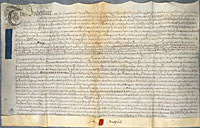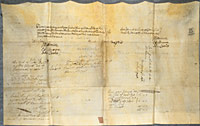Mortgage by demise
Purpose
A temporary transfer of property for a very long time (usually 500 or 1,000 years) in order to secure a loan of money.
Features of mortgages by demise
-
17th-19th centuries
- large
- written on parchment
- usually written in English
- indenture (wavy top edge)
- seal
Important words and phrases
The mortgage at first looks like a standard lease:
- It will include the phrase 'hath demised granted set and to farm let'. In Latin, the phrase is 'ad firmam dimisi'
- It is granted for a certain period of time, after which time the land would revert to the lessor
- There will be a rent payable to the lessor at specified times during the year, and sometimes services carried out for the lessor. The words usually used here are 'yielding and paying...'
However, the term of years will be a very long time - usually 500 or even 1,000 years. Also, the rent will not be a real payment. It is more likely to be a nominal sum such as a peppercorn, or 5 shillings.
There will be a proviso for redemption, beginning 'Providing Always...' In this clause, it may be stated that if the mortgagor pays the principal sum (the amount of money being lent) plus interest to the mortgagee on a certain specified date and place, 'then this Indenture ... shall cease determine and be utterly void'. If this is not stated, it can be assumed that the mortgagor has to pay back the money by the end date of the lease.
The date for repayment is usually given as one year from the date of the mortgage. However, this does not mean exactly what it appears to say. In most cases, mortgagees were happy with the interest being paid once or twice a year. Many properties remained mortgaged for years or even decades, because the mortgagor was unable or unwilling to pay back the principal sum and 'redeem' the mortgage; and because the mortgagee treated the mortgage as an investment which brought in a steady income. Often, mortgage deeds are endorsed with receipts for the payments made each year.
When a mortgage by demise was fully paid off, the lease of 500 or 1,000 years still had to be properly terminated. This was done by assigning the mortgaged premises to a trustee for the owner for the remainder of the term of years. This deed looks quite like an assignment of a lease, but it will include recitals explaining the history of the mortgage. It will also include the words:
'in trust to wait upon and attend the inheritance [or freehold]'.
If an additional sum of money was required by the mortgagor, this might be lent to him by the mortgagee and added to the original mortgage amount, as long as the combined sum was not more than the value of the land. A 'Further Charge' was a fairly simple deed reciting the original mortgage, and stating the amount of money added.
Examples
Ne 6 D 2/30/69 - Mortgage by demise from John Peatfield to Peter Dickonson of a farm in Milton, Nottinghamshire and lands in Milton, Markham Clinton, East Markham and Tuxford; 17 Nov. 1740


View this deed: front | reverse
We know that this deed is a mortgage by demise because of the following characteristics:
- It is an indenture, that is, the top of the deed is cut in a wavy line. This indicates that the deed was made between two or more parties. Some pairs of indentures were cut from the same sheet of parchment, and could be verified by checking that the top parts of each fitted together correctly
- It begins with the words 'This Indenture...'
- The land is demised to Peter Dickonson for 500 years
- There is a yearly rent of one peppercorn (a nominal sum indicating that it is not a real lease)
- It includes the phrase 'Provided always' and lists the conditions on which the Indenture will be made void
- It has been sealed by the mortgagor
This transcription of the important parts of the mortgage has been broken down into the standard sections common to most deeds from the early modern period onwards.
Date
This Indenture made the seaventeenth day of November in the fourteenth Year of the Reign of King George the second over Great Britain France & Ireland Defender of the faith and so forth and in the Year of our Lord one Thousand seaven hundred and forty
Parties
Between John Peatfield of Egmanton in the County of Nottingham Wheelwright of the one part and Peter Dickonson of Leeds in the County of York Merchant of the other part
Operative Parts or 'Testatum'
Witnesseth that the said John Peatfield for and in Consideration of the Sume of one hundred and Twenty pounds of good and lawfull British Money to him in hand well and truly paid by the said Peter Dickonson at or upon the sealing and Delivery hereof the receipt he the said John Peatfeild doth hereby acknowledge and thereof and of every part thereof doth clearly and absolutely acquit exonerate and discharge the said Peter Dickonson his Executors Administrators and Assignes for ever by these presents Hath Demised Granted Bargained and sold and by these presents Doth Demise Grant Bargain and sell unto the said Peter Dickonson his Executors Administrators and Assignes All that the said John Peatfeild's Messuage Farm house or Tenement scituate standing and being at Milnton in the parish of West Markham in the said County and all those severall parcells of Arrable Land Meadow and Pasture to the said Messuage or Farm house belonging and lying dispersed in the several feilds precincts or Territories of Milnton and West Markham aforesaid or either of them To wit In the Meadow feild by Estimation Three Acres In the West feild Two Acres In the East Feild four Acres and one Rood In the Stockings Two Acres and two Roods The Homestead Close Jenny Close Pingle Close Miln lane Close and Black Bridge Close and two Acres of Arrable in the feilds belonging to East Markham in the said County to wit one Acre in Little Harwell one rood in Great Harwell one rood under the Beacon Hill and Two Roods in the Miln feild in a place called the Cleves and also Three Gates in a place called Westwood at Tuxford in the same County All which s[ai]d premises are now in the Occupation of William Preist of his assiges Together with all the Outhouses Commons and Appurtenances whatsoever to the said Messuages or Tenement Closes Arrable Land Meadow and Pasture belonging or in anywise appurtaining and the Revertion and Revertions Remainder and Remainders thereof
'Habendum'
To have and to hold the said Messuage Farm house or Tenement and all and singular other the premises with the Appurtenances unto the said Peter Dickonson his Executors Administrators and Assignes from the day of the date hereof for and dureing the Term of five hundred Years from thence next ensueing and fully to be compleat and ended Yeilding and Paying therefore Yearly and every Year dureing the said Term unto the said John Peatfeild his Heirs or Assignes the Yearly Rent of one Pepper Corn upon Midsummer day if the same shall be lawfully demanded and not otherwise
Covenants, Conditions and Provisos
Provided always and these presents are upon this Condition nevertheless That if the said John Peatfeild his Heirs Executors Administrators or any of them do and shall well and truly pay or cause to be paid unto the said Peter Dickonson his Heirs Executors Administrators or Assignes the said Sume of one hundred and twenty pounds of good and lawfull British Money with lawfull Interest for the same of like Money at or upon the seaventeenth day of May next ensueing the date hereof without any Defalcation Deduction or Abatement for or in respect of any Taxes Charges or Assessments whatsoever ordinary or extraordinary to be taxed Charged or Assessed upon the said premisses or any part or parcell thereof or upon the said Sume of Money hereby appointed to be paid by any Order Ordinance Act or Acts of Parliament or otherwise howsoever that then this present Indenture and all the Term and Estate hereby Granted shall cease and be void to all Intents and Purposes whatsoever any thing herein contained to the contrary thereof in any wise notwithstanding And the said John Peatfeild for himself his Heirs Executors Administrators and Assignes and for every of them doth Covenant promise and Grant to and with the said Peter Dickonson his Executors Administrators and Assignes by these presents that he the said John Peatfeild his Heirs Executors Administrators or Assignes or some of them shall and will well and truly pay or cause to be paid unto the said Peter Dickonson his Executors Administrators or Assignes the said Sume of one hundred and twenty pounds of good and lawfull British Money with lawfull Interest for the same on the said seaventeenth day of May without any Defalcation Deduction or Abatement as aforesaid and according to the true Intent and meaning of the above written provisoe
Witnesses
In witness whereof the parties above named have to these present Indentures interchangeably set their hands and seals the day and Year first above written
[Signature and seal of John Peatfield]
Endorsements
[Receipt for the £120, signed by John Peatfield]
[Signatures of three witnesses]
[Various receipts for the annual interest due in November 1741, 1742, 1743, 1744 and 1745; and calculations of three and a half years interest plus the principal sum due in April 1748]
Ne 6 D 2/30/75 - Assignment from Peter Dickonson to George Johnson of the residue of a term of 500 years on property in Milton, Markham Clinton, East Markham and Tuxford, Nottinghamshire, in trust to attend the inheritance; 1 Apr. 1749
The mortgage was paid off seven years later when William Johnson bought the property from John Peatfield's widow. The deed of assignment of term of years to a trustee for William Johnson is found in the same deed bundle (Ne 6 D 2/30/75), and is described in the archive catalogue as follows:
First Party: Peter Dickonson, merchant, of Leeds, Yorkshire.
Second Party: Mary Peatfield, widow and relict of John Peatfield, and Robert Peatfield, baker, both of Wellow, Nottinghamshire.
Third Party: William Johnson, yeoman, of West Markham [Markham Clinton], Nottinghamshire.
Fourth Party: George Johnson, yeoman, of West Markham [Markham Clinton], Nottinghamshire.
Recitals: (a) mortgage by demise dated 17 Nov. 1740 [see Ne 6 D 2/30/69]; (b) the fact that the mortgage sum of £120 was not repaid; (c) the death of John Peatfield and details of his will; (d) the fact that (3) has purchased the mortgaged property from (2); (e) the fact that the sum of £138 remains owing to (1).
In consideration of the sum of £138 paid to (1) by (3), assignment from (1) with the consent of (2) to (4) of the residue of a term of 500 years on the property specified in the mortgage; the property is to be held in trust by (4) to attend the inheritance.
Next page: Mortgage by conveyance